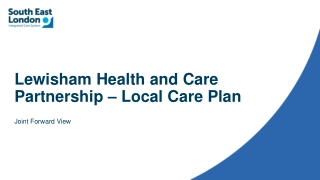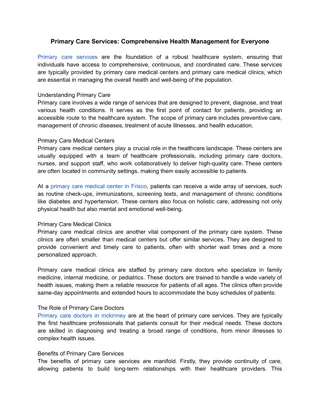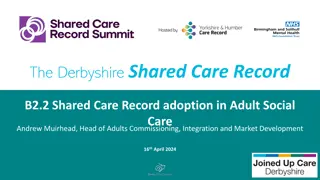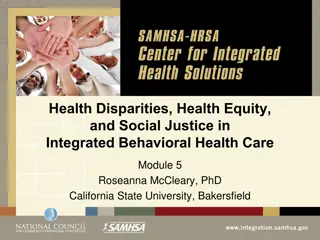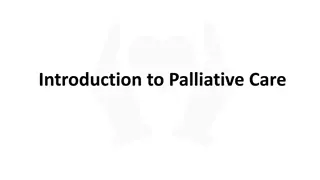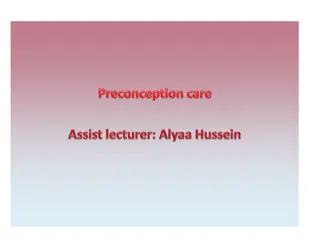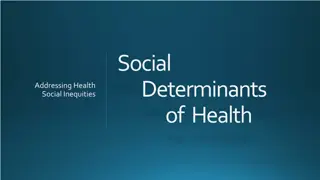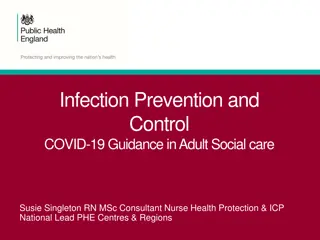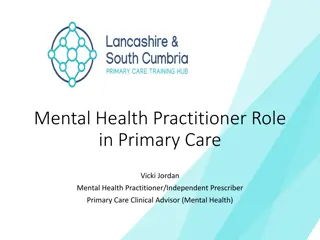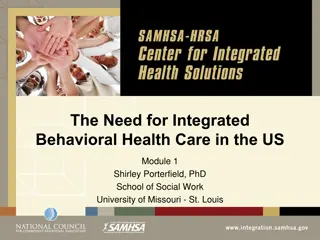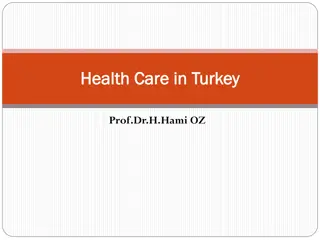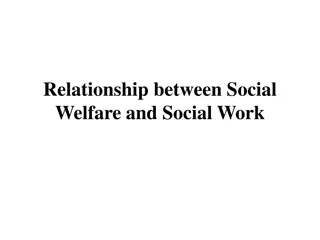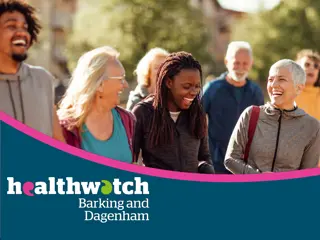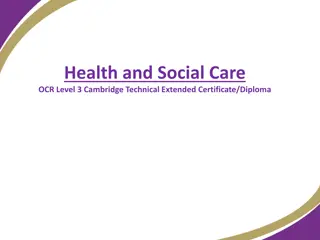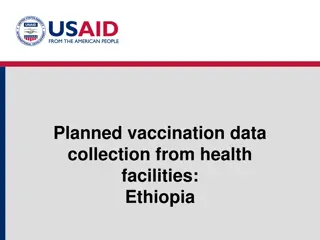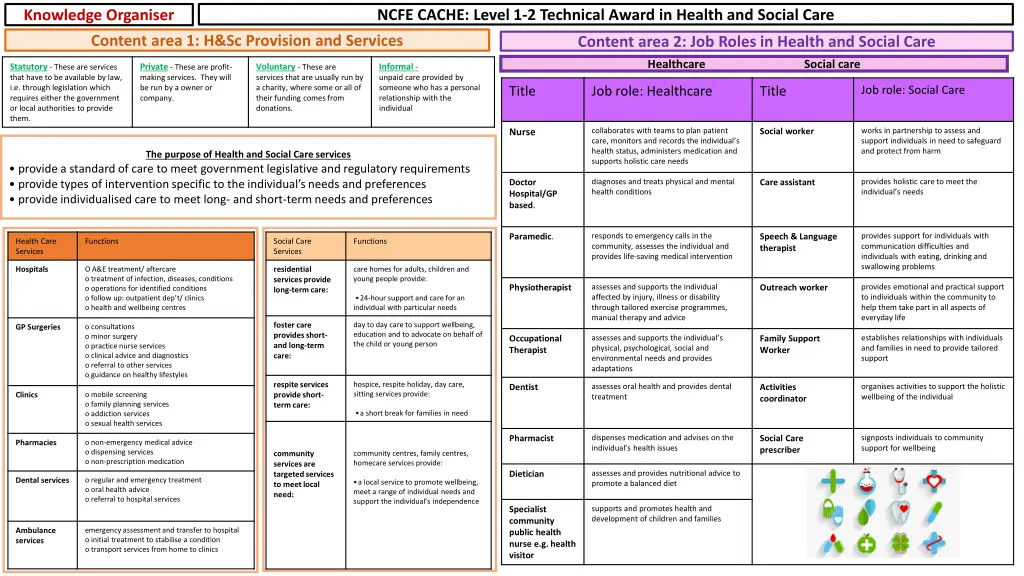
Health and Social Care Services Overview
Explore the diverse provision of healthcare and social care services, including statutory, private, voluntary, and informal services. Learn about various job roles in health and social care, such as social worker, nurse, doctor, and more. Understand the functions and responsibilities of healthcare and social care services, from hospitals to community outreach programs. Discover the vital roles of professionals like physiotherapists, occupational therapists, dentists, and pharmacists in promoting holistic well-being and addressing individual needs effectively.
Download Presentation

Please find below an Image/Link to download the presentation.
The content on the website is provided AS IS for your information and personal use only. It may not be sold, licensed, or shared on other websites without obtaining consent from the author. If you encounter any issues during the download, it is possible that the publisher has removed the file from their server.
You are allowed to download the files provided on this website for personal or commercial use, subject to the condition that they are used lawfully. All files are the property of their respective owners.
The content on the website is provided AS IS for your information and personal use only. It may not be sold, licensed, or shared on other websites without obtaining consent from the author.
E N D
Presentation Transcript
NCFE CACHE: Level 1-2 Technical Award in Health and Social Care Knowledge Organiser Content area 1: H&Sc Provision and Services Content area 2: Job Roles in Health and Social Care Healthcare Social care Statutory- These are services that have to be available by law, i.e. through legislation which requires either the government or local authorities to provide them. Private - These are profit- making services. They will be run by a owner or company. Voluntary- These are services that are usually run by a charity, where some or all of their funding comes from donations. Informal - unpaid care provided by someone who has a personal relationship with the individual Job role: Social Care Title Job role: Healthcare Title collaborates with teams to plan patient care, monitors and records the individual s health status, administers medication and supports holistic care needs works in partnership to assess and support individuals in need to safeguard and protect from harm Social worker Nurse The purpose of Health and Social Care services provide a standard of care to meet government legislative and regulatory requirements provide types of intervention specific to the individual s needs and preferences provide individualised care to meet long- and short-term needs and preferences diagnoses and treats physical and mental health conditions provides holistic care to meet the individual s needs Doctor Hospital/GP based. Care assistant responds to emergency calls in the community, assesses the individual and provides life-saving medical intervention provides support for individuals with communication difficulties and individuals with eating, drinking and swallowing problems Paramedic. Speech & Language therapist Health Care Services Functions Social Care Services Functions Hospitals O A&E treatment/ aftercare o treatment of infection, diseases, conditions o operations for identified conditions o follow up: outpatient dep t/ clinics o health and wellbeing centres residential services provide long-term care: care homes for adults, children and young people provide: assesses and supports the individual affected by injury, illness or disability through tailored exercise programmes, manual therapy and advice provides emotional and practical support to individuals within the community to help them take part in all aspects of everyday life Physiotherapist Outreach worker 24-hour support and care for an individual with particular needs foster care provides short- and long-term care: day to day care to support wellbeing, education and to advocate on behalf of the child or young person GP Surgeries o consultations o minor surgery o practice nurse services o clinical advice and diagnostics o referral to other services o guidance on healthy lifestyles assesses and supports the individual s physical, psychological, social and environmental needs and provides adaptations establishes relationships with individuals and families in need to provide tailored support Occupational Therapist Family Support Worker respite services provide short- term care: hospice, respite holiday, day care, sitting services provide: assesses oral health and provides dental treatment organises activities to support the holistic wellbeing of the individual Dentist Activities coordinator Clinics o mobile screening o family planning services o addiction services o sexual health services a short break for families in need dispenses medication and advises on the individual s health issues signposts individuals to community support for wellbeing Pharmacist Social Care prescriber Pharmacies o non-emergency medical advice o dispensing services o non-prescription medication community services are targeted services to meet local need: community centres, family centres, homecare services provide: assesses and provides nutritional advice to promote a balanced diet Dietician Dental services o regular and emergency treatment o oral health advice o referral to hospital services a local service to promote wellbeing, meet a range of individual needs and support the individual s independence supports and promotes health and development of children and families Specialist community public health nurse e.g. health visitor Ambulance services emergency assessment and transfer to hospital o initial treatment to stabilise a condition o transport services from home to clinics
NCFE CACHE: Level 1-2 Technical Award in Health and Social Care Knowledge Organiser Continued: CPD Continued Professional Development Content area 2: Job Roles in Health and Social Care Care Values Health and Social care values which underpin professional practice are integral to person- centred practice. They are standards which help to guide professionals in providing the most appropriate care. o care: consistent tailored care throughout life Compassion Communication continuing / continued professional development (CPD) = engaging in activities to develop and enhance both personal and professional skills o compassion: how care is underpinned by emphatic, respectful and dignified relationships Commitment . o competence: delivery of evidence-based care and treatment This helps the practitioner to manage their own learning and growth throughout their career. 6Cs: o communication: key to caring relationships and facilitating team working Courage Importance of CPD: o ensures knowledge and practice is current o courage: raise concerns and be open to innovative ways of working o commitment: dedicated to improving care and experience of the individual and embrace future challenges Care. Competence o meets regulatory requirements o ensures the quality of care duty of care: maintains legal requirement to protect the individual and act in their best interests o improves outcomes for the individual or service o enhances professional and personal growth of the practitioner safeguarding: ensures safety of the individual and protects from harm and abuse This continuous learning helps to open new doors (promotions or career progression), keep the practitioners skills and knowledge up to date to ensure they are practicing safely and legally. dignity: promotes the individual s self-respect respect: acknowledges diversity through recognising and responding to the individual s needs and preferences rights: promotes entitlements set out in law confidentiality: maintains privacy and security of personal information independence: enables the individual to make own decisions
NCFE CACHE: Level 1-2 Technical Award in Health and Social Care Knowledge Organiser Content Area 3: Legislation, Policies and Procedures Regulatory and Inspection bodies Care Quality Commission - regulates health and adult social care services OFSTED - regulates education, children s services and schools HCPC - register of health and care professionals NMC - register of health and care professionals Social Work England register of those who can practice social work Legislation Care Act 2014 Equality Act 2010 Data Protection Act2018 HASAWA 1974 H&SC Act 2012 Key roles of regulatory/inspection bodies: o uphold standards o ensure public confidence o register services o monitor, rate and inspect services o protect the individual Key roles and responsibilities of the practitioner o understand the related legislation, policies and procedures o adhere to the underpinning policies and procedures o work within own professional boundaries o understand how to escalate any concerns o allow for access to quality health and social care services defines protected characteristics: age, disability, gender reassignment, marriage and civil partnership, pregnancy and maternity, race, religion or belief, sex, sexual orientation defines data protection principles which require fair, lawful, and transparent handling and processing of personal information defines duties in relation to assessment of needs and their eligibility for publicly funded care and support defines responsibilities for maintaining health and safety at work defines the planning, delivering and monitoring of healthcare services Content Area 4: Human Development across the Lifespan Through the life span, development is refined and often areas of development decline as a result of the ageing process or disease: holistic development: sees the individual as a whole person where all areas of development are incorporated interdependency: the relationship and the dependency of each area of development and its impact on the individual s wellbeing Procedures in relation to the following policies: Inclusion Policy Health and Safety Confidentiality Transitions: Changes from one stage to another in the individual s life. Can be expected/unexpected inclusive practice which promotes: a person-centred approach dignity respect risk management: risk assessment information management: Infancy (0-2 years) Childhood (3 10y) - Adolescence (11 17 y) Early Adulthood (18 29 y ) Middle adulthood (30 60) Late adulthood (60+)Vo employment O marriage/civil partnerships O parenthood O divorce O bereavement O retirement O diagnosis of medical conditions sharing information: gain consent need to know basis storage of information: maintain secure environment password protected locked filing cabinet Start nursery Arrival of new sibling o onset of puberty o sitting examinations o leaving home equal access which ensures: non-discriminatory practice barriers to access faced by the individual are overcome adaptations to environment are put in place to meet the individual s needs and preferences aids and equipment are secured to meet the individual s needs and preferences infection prevention and control: hand washing use and disposal of personal protective equipment (PPE) disposal of waste and body fluids Equality and Inclusion Procedure recognise and celebrate individuals Ensure dignity and respect Reasonable adjustments Appropriate resources Adapt materials Positive images Treating every equally Meeting individual needs Ensure anti-discriminatory practice Health and safety procedure risk assessments Security checks Safety of equipment First aid procedures Report incidents/accidents Hygiene routines Follow emergency and fire evacuation procedures Safe disposal of bodily fluids and waste Manual handling safety Safeguarding Procedure Protecting children Physical abuse Emotional abuse Sexual abuse Neglect How to respond and report reporting and recording: timely factual legible Confidentiality Procedures Build trust between all hose involved Safeguarding Legal requirement Privacy Obtain consent/permission Need to know; principle security: security checks: identity and the environment valuing diversity which celebrates individual differences: values, beliefs, traditions manual handling: correct moving and handling techniques accident and incident: reporting and recording emergency evacuation
NCFE CACHE: Level 1-2 Technical Award in Health and Social Care Knowledge Organiser Content Area 4: Human Development across the Lifespan Factors which may impact human development Lifestage Age (years) Physical Development Cognitive Development Emotional Development Social Development Biological o inherited characteristics and health conditions e.g. Cystic fibrosis, PKU, Down Syndrome, Susceptibility to: cancer, high blood cholesterol, diabetes Environmental o lifestyle: way of living; the things that a person or particular group of people usually do rest physical activity diet drugs and alcohol o socio-economic: differences between groups of people relating to their social class and financial situation education employment income o relationships: family partners friendships o culture: Culture encompasses religion, food, what we wear, how we wear it, our language, marriage, music and is different all over the world. values traditions and expectations o physical environment: urban rural can sit can roll over can walk learns and responds through senses points to body parts language develops (E.g. babbling, single words, range of 200 words) responds to simple command attachments form with main carer may develop temper tantrums waves bye-bye communicates by smiling can become wary of strangers Infancy 0-2 years can stand on one leg can ride a tricycle cut along a line legible handwriting confident handling equipment during sports greater coordination/ peed with fine & gross motor skills develops pre-reading then reading skills problem solves gives reasons for actions talks with increasing fluency and confidence shows affection for younger children develops fairness and sympathy for others willing to share toys can enjoy team games often has a best friend Childhood 3-10 years puberty & sexual maturity reached muscle mass increase changes body shape/ height develops complex thinking skills memory functions efficiently has ability to think, reason and make choices mood swings are common development of more intimate relationships can become self-conscious influenced by views, opinions and behaviours of friends (peer pressure) increasing independence from parents friendships become very important Adolescence 11 17 years full height is reached body strength at maximum application of analytical skills to work environment/home becomes more established in the workplace stress due to work, finances and relationship problems emotional bonds may form with partners and own children relationships form with people from work friends and social relationships often change Early adulthood 18 29 years menopause occurs loss and greying of hair muscles start to lose strength cognitive thinking begins to decrease has range of life experiences which may affect future changes in relationships feelings of loss when children leave home period of self-doubt and mid-life crisis relationships with grandchildren are important friendships continue from school, through work and outside activities Middle adulthood 30 60 years How the practitioner can prepare & support the individual for transition: building and maintaining positive relationships with the individual involving the individual in planning for the transition discussing exploring and reassuring the individual in relation to the transition working in partnership with the individual, relevant others and other practitioners providing information and advice, signposting the individual to appropriate services referring the individual for specialist support as required. decline in mobility visual and hearing degeneration loss of bone density short-term memory loss decline in attention span loneliness due to isolation less anxiety in life due to no work pressure self-esteem and confidence may decrease anxiety over reduced income and care costs can develop new relationships through new interests isolation due to lack of social contact in the workplace Late adulthood 60+ years
NCFE CACHE: Level 1-2 Technical Award in Health and Social Care Knowledge Organiser Content Area 5: The care needs of the individual How conditions and disabilities may impact on care needs Physiological and biological requirements for human survival o food and drink: ability to prepare food and drink ability to meet own nutritional requirements ability to eat and drink unaided o rest and sleep: disruption to sleep pattern o personal care: toileting: incontinence because of a health condition incontinence because of mobility ability to care for skin, hair and teeth ability to dress/un-dress ability to select clothing for the season Conditions and disabilities that require health and social care support Safety, security and control o environment: ability to maintain own safety ability to maintain own security o healthcare: ability to access services and treatment ability to manage own medication o emotional security: ability to cope with anxiety and stress level of resilience o financial security: employment status available funds to maintain lifestyle and meet needs disability: physical or mental condition that has a substantial (more than minor) and long-term (12 months+) impact or effect on an individual s lifestyle (Equality Act 2010) chronic condition: a physical or mental condition which is long-lasting in its effects (lasts at least 3 months but usually lasts a year and is often life-long) acute condition: a physical or mental condition which is of short duration, intense, develops quickly but generally has no lasting effects o types of disability include: cognitive physical mental sensory Love and belonging o maintain active relationships: with family, partners, friends and community level of involvement with others level of isolation and loneliness Care Values in Practice: Meal times o agree with the individual the level of assistance required o provide necessary aids and adaptations to promote independence o ensure safe food handling and preparation is maintained Esteem, dignity and respect for others o self-confidence: level of self-confidence o independence: level of dependency: ability to self-care: Personal Care and Toileting o agree support required o meet preferences in choice of care and dressing o provide aids and adaptations to promote independence o ensure privacy and dignity by: shutting doors closing curtains being unobtrusive Self-actualisation and realisation for full potential o personal growth: ability to achieve own potential o self-fulfilment: desire to achieve own potential Activities o find out the individual s interests and preferences o involve family, friends and others at the request of the individual o provide activities to meet choices
NCFE CACHE: Level 1-2 Technical Award in Health and Social Care Knowledge Organiser Content Area 7: Partnership working Content Area 6: How Health and Social Care Services are accessed Different Practitioners working together to meet individual needs Referral Improves outcomes: using the expertise of other practitioners knowledge, skills and experience working together towards shared goals to ensure consistent and continuous care for the individual clarifying roles and responsibilities of all practitioners Self The individual initiates direct access: makes an appointment with a health or social care practitioner attends a walk-in service Third Party: Family member or friend supports /makes the referral accesses a service on behalf of the individual Professional o professional initiates access to: another health or social care practitioner or service establishing care to meet the individual s needs and preferences enabling interventions to meet the individual s needs and preferences ensuring safeguarding Barriers to accessing services: communication: culture: Location: Barriers to Partnership working Strategies to overcome the barriers o barriers that impact on accessing and understanding information: sensory impairment cognitive impairment English as an additional language overcome barriers: o barriers that impact on the individual s acceptance of medical treatment and support: values beliefs o barriers that impact on the individual s ability to access services: transport cost capability of the individual to access building COMMUNICATION agree shared goals be inclusive avoid use of jargon build respect and confidence acknowledge and understand viewpoints of others COMMUNICATION level of understanding level of trust assumptions overcome barriers: overcome barriers: TIME MANAGEMENT ineffective time management skills conflicts in priorities workload ensure effective tailored communication skills are maintained by: providing information in alternative formats providing access to specialist professional services ensure inclusive practice to meet the individual s values and beliefs ensure practitioner awareness of a range of culture, values and beliefs and their impact on care needs and preferences provide community services provide aids and adaptations online/telephone consultations online prescription ordering and delivery TIME MANAGEMENT establish practitioners commitment and availability select agreed dates, times and venues use appropriate mode of communication
NCFE CACHE: Level 1-2 Technical Award in Health and Social Care Knowledge Organiser Exam breakdown How am I being assessed? Content Area 8: The care planning cycle Assessment breakdown 1 hour 30 minutes examined assessment 14 hours non-exam assessment Purpose o to work with individuals as equal partners when planning and implementing their care o the individual is central and in control of their care impact: o builds trust between the individual and the H&SC practitioner o meets the individual s needs and preferences and establishes support required o enhances the individual s confidence and self esteem o promotes the individual s independence o empowers the individual Non-exam assessment (NEA) 50% Externally-set, internally marked and externally moderated: Synoptic project Externally set and externally marked: Written exam Overall grades: Level 1: pass, merit and distinction Level 2: pass, merit and distinction Examined assessment (EA) Total 50% 100% Care plan care plan: a record that outlines the standardised care and support required to meet the individual s holistic needs and preferences with reference to Maslow s hierarchy of needs Assess (PLAN) implement: (DO) Top Exam Tips o identify the individual s needs and preferences o identify any risks o discuss and agree care and support required with the individual and relevant others o communicate agreed outcomes with the individual and relevant others o record information and outcomes on the individual s care plan o agree strategies to meet individual s needs/ preferences o work in partnership with other professionals/services as appropriate o offer advice / guidance to the individual and relevant others o obtain required aids and adaptations o set target / review dates o carry out agreed care / support to meet the needs and preferences of the individual o monitor and record information and outcomes on the individual s care plan Before the exam holistic needs: o physical o cognitive o social and emotional During the exam Revision Plenty of rest/sleep Manage your time Exercise Ask for help Make a revision timetable Have enough food and drink Get organised Arrive early for exam Read questions carefully Answer every question Use all the time you have been provided Re-check your answers if you have spare time Highlight keywords if you find it helpful Be positive Stay calm Stages of the cycle: Assess, Implement, Monitor, Review(Modify) Review o observe the extent to which the individual s needs and preferences have been met o agree any changes required

